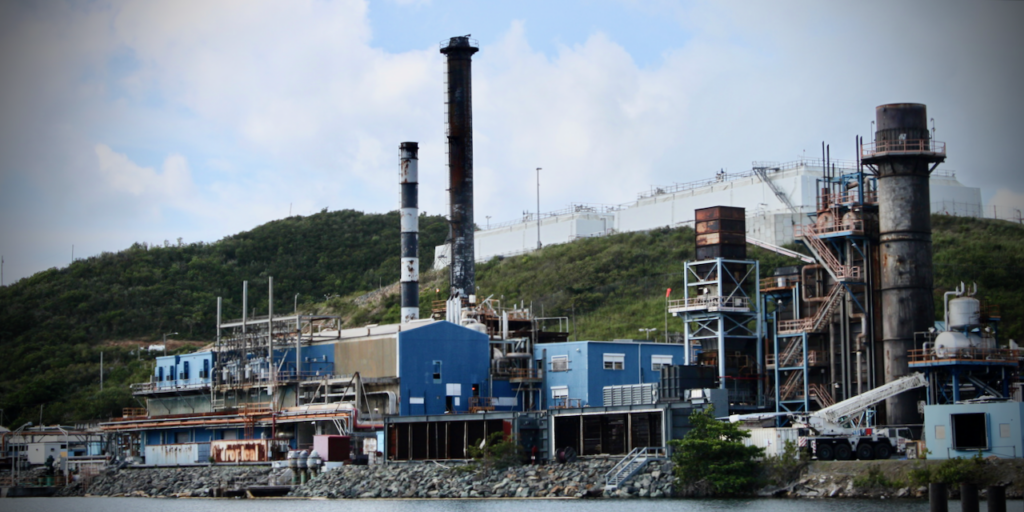
The territory was rocked this week with the news that the V.I. Water and Power Authority’s primary fuel supplier, Vitol, intends to suspend delivery to the territory, throwing the community into a panic that rolling blackouts could be imminent. Speaking with the Source this week, WAPA Executive Director Andy Smith said the authority is considering all scenarios but is working with Government House to come to a resolution as quickly as possible.
Smith, who has been on the job since January, said the issue isn’t payment for propane. The territory pays for that upfront and is current on its bills. Instead, the back and forth between WAPA and Vitol hinges on payment owed for infrastructure Vitol helped bankroll in 2014 and 2016. The Virgin Islands and Vitol disagree on the total amount owed — Vitol contends over $145 million, of which Smith said WAPA has paid $76 million — but that doesn’t matter as Smith said WAPA doesn’t have the money to pay anyway.
“What we proposed to Vitol is that the Water and Power Authority cannot make the infrastructure payment while its cost of fuel is so high,” Smith said, adding that he has been in discussions with Vitol since he got on the job. “We’re working to fix that, and once we fix that, then we can go out and potentially raise some financing to be able to address the debt. But until we can get to that point organically, we have no ability to do that.”
Vitol made its intentions clear in a letter sent to Government house Friday, which Smith described as disappointing, as it puts the territory — particularly the energy security offered to more vulnerable populations at risk. In the worse case, propane runs out on St. Croix on Nov. 30 and on St. Thomas on Dec. 2, but as a backup, there are limited diesel stores on hand — though Smith said it’s twice as expensive. The authority can run both districts on diesel, but what it has to be careful of is making sure that priority customers — such as the hospitals, or Seven Seas, which supplies the territory’s potable water — keep operating to “ensure the safety and welfare of the community,” Smith explained.
Rotating power could then be implemented to limit fuel consumption, and the authority is starting now to develop a schedule that offers a balance between meeting infrastructure needs and how long the power is out.
“It’s disappointing to me that our preferred fuel supplier has taken this path,” Smith said. “This is putting the energy security of the Virgin Islands at risk. It’s putting our most vulnerable populations at risk.”
In contrast, there are several customers providing critical services — such as healthcare — that owe WAPA, but consideration of the impact on the community is weighed before their power is cut, Smith said, adding that he’s more optimistic about ongoing talks with two potential high-profile alternate suppliers that could step in.
But, because WAPA pays Vitol for the operation of the propane system, the question remains whether the company will honor its agreement to keep it running if another company’s fuel is used. In short, the propane coming into the territory is liquid and has to be turned into gas in order to produce power and Vitol is paid — so far $42 million — to do it.
“With an alternate fuel supplier, because we’re paying Vitol for the operation of the facility, my position is that our fuel supplier has failed to perform, so we’ve gone out and secured an alternate supplier of propane — we’ve been paying for the operations of the facility, so let’s operate. Let’s gasify the propane and keep the lights on for the Virgin Islands,” Smith said.
As discussions continue, Smith stressed that there is a “commercially reasonable solution that’s both equitable and fair” for all parties but in the meantime, it’s got to be clear that WAPA doesn’t have the ability to go out and borrow at this point, especially since an infrastructure charge included in utility bills to pay for the amount in dispute was removed by the Public Services Commission early this year.
“Talking with Government House, I believe there is a commercial resolution to this,” Smith said when asked if there are concerns for a federal intervention if the back and forth continues. “It’s not $145 million dollars, in my mind, but we’re not there yet. However, if this continues for an extended period of time, that may change.”


